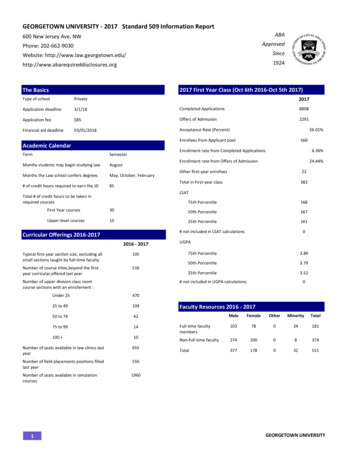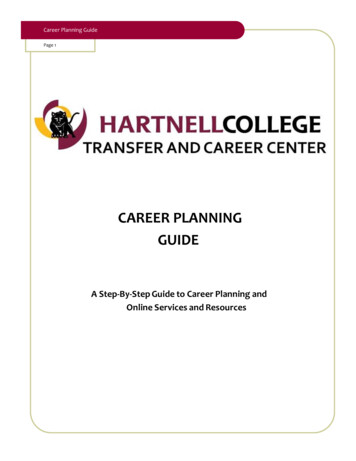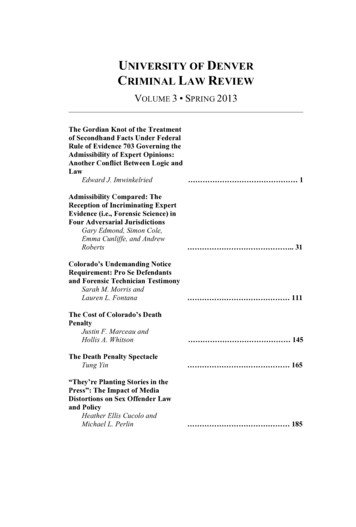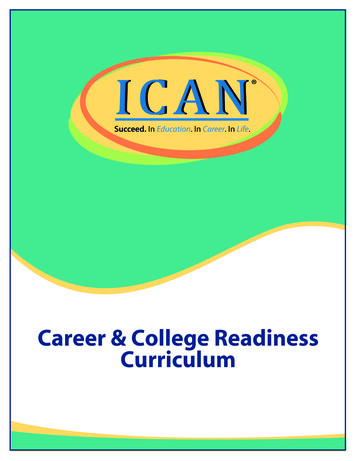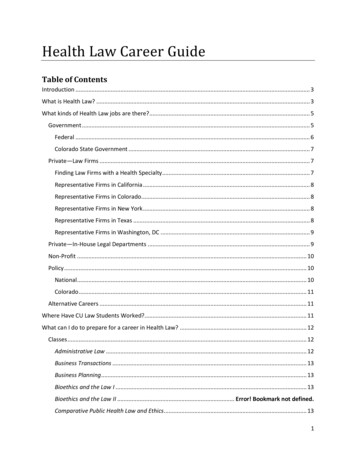
Transcription
Health Law Career GuideTable of ContentsIntroduction . 3What is Health Law? . 3What kinds of Health Law jobs are there? . 5Government . 5Federal . 6Colorado State Government . 7Private—Law Firms . 7Finding Law Firms with a Health Specialty. 7Representative Firms in California . 8Representative Firms in Colorado. 8Representative Firms in New York . 8Representative Firms in Texas . 8Representative Firms in Washington, DC . 9Private—In-House Legal Departments . 9Non-Profit . 10Policy . 10National . 10Colorado . 11Alternative Careers . 11Where Have CU Law Students Worked?. 11What can I do to prepare for a career in Health Law? . 12Classes . 12Administrative Law . 12Business Transactions . 13Business Planning . 13Bioethics and the Law I . 13Bioethics and the Law II . Error! Bookmark not defined.Comparative Public Health Law and Ethics . 131
Corporate Transactions in Health Law . 13Family Law . 13Government Regulation of Business . 13Healthcare Systems . 14Health Law I—Finance, Administration and Organization of Healthcare. 14Health Law II—Medical Malpractice Litigation . 14Introduction to In-House Practice of Law. 14Introduction to Intellectual Property Law . 14Non-Profit Law . 14Poverty, Health and Law Practicum . 15Principles of Auditing, Compliance and Risk Management . 15Public Health Law and Ethics . 15Practical Experience . 15Student Organizations . 15Health Law Society . 15Barristers’ Council . 16Business Law Association . 16Colorado Natural Resources, Energy, and Environmental Law Review . 16Journal on Telecommunication and High Technology Law (JTHTL) . 16Public Interest Students Association. 16Silicon Flatirons . 17University of Colorado Law Review . 17Professional Organizations and Associations . 17National . 17Colorado . 172
Health Law Career GuideIntroductionHealthcare is a complex and fast-changing industry that touches many areas of law, including litigationand transactional work in the public and private sectors, and work with non-legal entities. Legal jobsrelated to health care pop up in federal and state government, private firms, and in-house legaldepartments in big companies, among others. Healthcare touches a wide range of legal practice areas,such as corporate law, torts, criminal law, antitrust, administrative, real estate, and regulatorycompliance. The range of positions where health law attorneys find jobs is broad. They includeorganizing how providers are structured and paid, regulating foods, drugs, and medical devices, diseaseprevention and health promotion to improve public health, and negotiating complex transactions tosatisfy the changing demands of a dynamic market. This guide details different types of health lawemployers for Colorado Law students to consider, and outlines ways for students to become involvedwith health law while in law school, in order to maximize your marketability to health law employerswhen you graduate.What is Health Law?Health law is a unique practice area because it focuses on an industry, rather than a specific body of law.Health law touches all aspects of the healthcare industry, including the organization, financing, anddelivery of healthcare services. Because the industry is so expansive, healthcare intersects with manytypes of law, including antitrust, corporate, transactional, litigation, contracts, antitrust, criminal,bioethics, intellectual property, tax, labor, and regulatory, among others. Health attorneys may becalled on to serve in a number of roles, such as client counseling and training, transactional drafting,negotiation, litigation (both in court and administrative agencies), and government relations. Here aresome descriptions of issues that Health Law attorneys address: Accreditation – Regulating the quality of health care institutions through federal and stateboards as well as private entities such as The Joint Commission or National Committee forQuality Assurance. State licensing boards and certification organizations offer litigationopportunities Advocacy – Special interest organizations that address health policy issues afford opportunitiesto participate in impact litigation or legislative advocacy. These can include organizations at thenational level such as Health Law Advocates, Center for Medicare Advocacy, HIV Law Project, orthe AARP Foundation Litigation, and at the state level such as the Colorado Consumer HealthInitiative. Also, national and state level professional associations such as the American HospitalAssociation or the Colorado Medical Society have political action committees that employlawyers.3
Bioethics – The number of attorneys who claim this as a full-time specialty is small howevermany attorneys who represent hospitals and other large providers confront ethical issuesregularly in their practices and some public interest firms and organizations such as theBioethics Defense Fund, the Presidential Commission for the Study of Bioethical Issues, or theCenter for Practical Bioethics Biotechnology and Patent Law – There is a shortage of attorneys trained in science andtherefore qualified graduates are in demand in patent law and in the biotech industry. Thesefields are dynamic and changing as the laws are still developing as well as new products andscientific applications are changing rapidly Compliance – This is a burgeoning specialty for attorneys trained in health law, whetherinstitutions require representation to meet fraud and abuse requirements, or satisfying therequirements of HIPAA Privacy, Food, Drug and Cosmetic Act, Foreign Corrupt Practices Act,Prescription Drug Marketing Act, the Federal Sunshine Law, Data Privacy under HITECH, and amyriad of other regulatory provisions, there are a number of institutions that need the expertiseof health care lawyers Contract and Corporate Matters – This area has blossomed for health care attorneys helpingentities meet the demands of health reform. Mergers, acquisitions, physician practicesales/purchases, tax conversions, creation of accountable care organizations, joint ventures, andintegrated practice associations are among the many types of transactions that require healthcare attorneys. Health care lawyers in these areas may specialize in tax, antitrust, or generalcorporate law as these areas apply to the health care industry Criminal Law – Prosecution and defense of Medicaid and Medicare fraud comprises most of thecriminal work in health care. Apply for positions with the Office of United States Attorneysthrough the United States Department of Justice or the Federal Trade Commission if this workinterests you at the federal level, and apply to work with State Medicaid Fraud Control Units toprosecute Medicaid fraud at the state level Employment and Labor Law - Issues ranging from discrimination and harassment, immigration,Americans with Disabilities Act and wage and hour compliance to counseling and advocacyrelated to workplace violence, workforce restructuring, and labor/management relations are afew of the types of issues health care institutions must face that require legal expertise. Somelaw firms have developed a specialty in this area, such as Squire Sanders (now Squire PattonBoggs) but many opportunities exist in smaller firms as well as in government enforcing aplethora of major labor laws such as OSHA, the FLSA, ERISA, Federal Mine Safety and Health Act,Migrant and Seasonal Agricultural Worker Protection Act, and state workers’ compensationlaws.4
Insurance – Health plans and the organizations that represent them, state departments ofinsurance, and insurers hire health care attorneys. Also, state malpractice insurers such asCOPIC and The Doctors Company employ general counsel. Finally, state and federal run healthinsurance exchanges such as Connect For Colorado post job openings requiring the analyticalskill possessed by CU graduates trained in health law Medical Malpractice – Whether litigating on the plaintiff or defense side health law attorneyspracticing in this area will help to shape the standard of care in their states. Medical malpracticespecialists also consult on methods to deter negligent practice through the structurecompensation and insurance systems, or advocate for policy changes in the malpractice systemoverall Pharmaceutical and Medical Device Consulting and Regulation – Attorneys may specialize inthe regulatory approval processes required for new drugs and medical devices, drafting andnegotiating terms for patients to access experimental drugs, reimbursement policy, intellectualproperty right issues, and reimbursement issues to name a few issues that provide work forhealth law attorneys in these fields Real Estate Law – Medical real estate development, negotiating and drafting agreements tolease, purchase, or restructure medical property and facilities are some of the opportunities inthis field.What kinds of Health Law jobs are there?While health law was already a robust field, the passage of the Patient Protection and Affordable CareAct in 2010 created more work for lawyers. Every aspect of the industry is evolving to keep up with andadapt to the requirements of a reformed health care system and a changing market, includinghealthcare providers, public and private insurers, and pharmaceutical and medical device companies.Possible practice areas or careers include: medical malpractice litigation; transactional representation;in-house practice for health care providers, insurers, medical technology companies, and others;regulatory compliance for health care companies; federal or state regulatory enforcement and defense;health information technology; lobbying; consulting; hospital administration; state Board of MedicalExaminers; non-profit organizations; disability law; elder law; emergency preparedness and homelandsecurity; academics and research; and legal publishing.GovernmentFederal, state, and local governments play an important role in regulating almost all aspects health care.A student interested in health law may find many opportunities with different agencies.5
FederalThis section lists resources to search for jobs with federal agencies that interact with health and healthcare. See also the CDO's resource entitled “Federal Government Internship Opportunities Guide” andmake an appointment with the CDO for more information on the nuts and bolts of applying.Searching for U.S. Government Jobs Federal Government Internships Federal Jobs Digest FedWorld Govtjobs.com USA JobsGovernment Agencies & Departments with ties to Health Care Department of Commerce Department of Health and Human Serviceso Agency for Healthcare Research and Qualityo Centers for Disease Control and Preventiono Centers for Medicare and Medicaid Serviceso Food and Drug Administration Department of Labor Department of Justice, Office of the United States Attorneyo Antitrust Divisiono Civil Divisiono Criminal Defense Federal Trade Commission Internal Revenue Service National Institutes of Health Natural Science Foundation Office of Diversion Control U.S. Agency for International Development (USAID) U.S. Patent and Trademark Office U.S. Department of Veterans Affairs Indian Health Service White House Office of Science and Technology Policy (See OSTP Internships)Federal Legislative BranchesConsider writing to committee members or applying for internships to work on health related legislationat the national level with the following legislative committees: U.S. Senate Committee on Health, Education, Labor, & Pensions6
Health Subcommittee of House Energy & Commerce CommitteeHealth Care Subcommittee of Senate Finance CommitteeHealth Subcommittee of House Ways and Means CommitteeColorado State Government Department of Health Care, Policy & Financing Department of Human Services Department of Public Health & Environment Department of Regulatory Affairs (DORA) DORA Division of Insurance DORA Licensed Professions Division: Governor’s Office of Policy, Research and Legislative Affairs State Medicaid Fraud Control Unit (Office of the Attorney General)Private—Law FirmsHealth care companies and providers frequently seek legal counsel from law firms. A firm with a healthlaw practice may represent clients from the health care industry on issues including medicalmalpractice, mergers and acquisitions, antitrust, licensing, and intellectual property. Listed below arelaw firms with a health care specialty, and a representative list of firms in popular locations, includingCalifornia, Colorado, New York, Texas, and Washington D.C. You can easily identify the law firms withhealth law practices in any market but these are examples to get you started.Finding Law Firms with a Health SpecialtyFinding law firms with a health law practice area can be tricky. Law firms sometimes list healthcare asan industry in which they are involved, while others list it as a practice area. Sometimes, practice areasmay be called something different or more specific, such as “medical malpractice,” or lodged underanother term, such as “intellectual property.”When you use the website listed below, begin by searching for the location you want. You can filter theresults to search for firms with a health or healthcare practice area or industry. You will see how manyattorneys at the firm practice in that area. Keep in mind that if only one attorney has medicalmalpractice listed as one of many practice areas, it is unlikely that the firm as a whole has a health carepractice. Look for firms with a couple of partners and associates that list health care as a primarypractice; this is a better indication that the firm supports a more robust health law practice. Also, a firmmay have multiple offices, so make sure the attorneys who practice health law are in the office in thecity in which you are interested. MartindaleBest Law Firms (US News)NALP Directoryo NALP currently does not list Health Law or Healthcare as a practice area, but this is agood starting point to find firms in your desired location.7
Representative Firms in California Sheppard, Mullin, Richter & Hampton, LLP (Los Angeles) Foley & Lardner, LLP (Los Angeles) Dowling Aaron Inc. (Fresno) Susson, Parrett & Odell, PC (Irvine) Schuering, Zimmerman & Doyle, LLP (Sacramento) Bingham McCutchen (San Fransisco) Arent Fox (Los Angeles) Davis, Wright, Tremaine, LLP (Los Angeles) Crowell & Moring, LLP (Los Angeles, San Fransisco, Orange County) Manatt, Phelps & Phillips, LP (Los Angeles, San Fransisco)Representative Firms in Colorado Caplan and Earnest, LLC Cooper & Clough, PC Davis, Graham & Stubbs, LLP Faegre Baker Daniels, LLP Hershey Decker, PLLC Holland & Hart, LLP Husch Blackwell LLP Jaudon & Avery, LLP Kutak Rock, LLP Polsinelli, PC Sherman & Howard, LLC Gordon & Rees, LLPRepresentative Firms in New York Bond, Schoeneck & King, PLLC (Albany) Cadwalader, Wickersham & Taft LLP Covington & Burling, LLP Damon Morey, LLP (Buffalo) Edwards, Wildman, Palmer, LLP Greenberg Taurig, LLP Mayer Brown, LLP Wilson Elser Moskowitz Edelman & Dicker LLP Foley & Lardner, LLP Ruskin, Moscou, Faltischek, P.C. (Uniondale)Representative Firms in Texas Wilson, Elser, Moskowitz, Edelman & Dicker, LLP (Houston) Greenberg Taurig, LLP (Dallas) Husch Blackwell, LLP (Austin) Waller, Landsend, Dortch & Davis, LLP (Austin)8
Cowles & Thompson, PC (Dallas)Watson, Caraway, Midkiff & Luningham, LLP (Fort Worth)Bourland, Wall & Wenzel, PC (Fort Worth)Atchley, Russell, Waldrop & Hlavinka, LLP (Texarkana)Quillin Law Firm, PC (Dallas)Whitaker, Chalk, Swindle & Schwartz, PLLC (Fort Worth)Representative Firms in Washington, DC Covington & Burling, LLP Drinker, Biddle & Reath, LLP Ober Kaler Latham & Watkins, LLP McDermott, Will & Emery, LLP King & Spalding Powers, Pyles, Sutter & Verville, PC Reed Smith, LLP Sidley Austin, LLP Skadden, Arps, Slate, Meagher & Flom, LLPPrivate—In-House Legal DepartmentsMany large health companies have in-house legal departments. This includes health systems, hospitals,medical groups, and other health care providers; pharmaceutical companies; medical technology anddevice companies; insurance companies; and others. The following section provides a list of examples oflocal companies and health care providers who may have in-house legal departments: Health Systems:o Catholic Health Initiativeso Centura Healtho SLC Health Care Systemso University of Colorado HealthHealthcare Companies:o DaVita Healthcare Partnerso Kaiser PermanenteHospitals:o Avista Adventist Hospital (Centura)o Boulder Community Hospitalo Children’s Hospitalo Denver Healtho Lutheran Medical Center (Exempla)o National Jewish Healtho Porter Hospital (Centura Health)o St. Anthony’s Hospital (Centura)9
Pharmaceutical and Medical Device Companies:o Amgeno CovidienHealth Insurance and Malpractice Insurance Companies:o COPICMedical Research:o University of Colorado Health Scienceso Agilent TechnologiesNon-ProfitThe nonprofit sector provides opportunities for legal jobs such as tax advising, regulatory compliance,and others, along with JD Advantage jobs, such as grant-writing. Some local non-profit hospitals include:o Avista Adventist Hospital (Centura)o Boulder Community Hospitalo Children’s Hospitalo Denver Healtho Lutheran Medical Center (Exempla)o National Jewish Healtho Porter Hospital (Centura Health)o St. Anthony’s Hospital (Centura)Other nonprofit organizations that advocate for health include:o American Red Crosso Caring for Colorado Foundationo Mile High United Wayo Colorado Consumer Health Initiativeo Colorado Coalition for the Medically UnderservedNonprofit resources and listingso The Alliance for Advancing Nonprofit Healthcareo Colorado Nonprofit AssociationSee the “Policy” and “Professional Organizations and Associations” sections for more ideas.PolicyGovernment positions offer the opportunity to work in health policy. Some examples include aninternship with the Health Policy Advisor at the Governor’s office or with the Colorado Department ofHealth Care Policy and Financing. See the “Government” section for more information. Otherorganizations offer ways to be involved with health policy through research and advocacy. See the listbelow and the “Professional Organizations and Associations” section for more ideas.National Brookings Institute10
The Henry J. Kaiser Family FoundationThe Commonwealth FundRAND CorporationRobert Wood Johnson FoundationColorado Colorado Center on Law and Policy Colorado Health Foundation Colorado Health Institute Colorado Public Health Association The Colorado Trust Public Health Alliance of ColoradoAlternative CareersThe health care industry is complex and there may be many alternative positions in healthcarecompanies where a J.D. would be advantageous. Some of these jobs include: compliance officer, riskmanagement officer, and project manager. There are also a number of consulting firms with clients inthe healthcare industry who may appreciate consultants who understand the intricacies of health law. Ifyou are interested in an alternative career, schedule a meeting with the CDO to brainstorm ideas aboutcareers that suit your interests where a J.D. would be beneficial.Where Have CU Law Students Worked?Several CU students have worked in health care internships with health systems, hospitals, governmentagencies, medical device companies, and law firms. If you are interested in one of these organizations,the CDO can connect you with a student who previously worked there. Adventist Health SystemCatholic Health InitiativesCentura HealthChildren's Hospital of ColoradoColorado Department of Health Care Policy and FinancingColorado Regional Health Information OrganizationColorado Consumer Health InitiativeCovidienDaVitaGovernor’s Office (Health Policy Advisor)Hershey DeckerKaiser PermanenteNovartisPolsinelli ShughartSuperior Medical Supply11
TolmarUniversity of Colorado HospitalVascular SolutionsWhat can I do to prepare for a career in Health Law?The number one way to prepare for a career in Health Law is to enroll to earn the newly approvedCertificate in Health Law and Policy.Health Law and Policy CertificateLaw students may demonstrate to employers that they are prepared to practice health law and lead inthe administration financing, organization policy-making and delivery of health care by earning a HealthLaw & Policy Certificate (HLP). To qualify for the HLP Certificate a student must earn 92 credit hours –three more than required for a regular J.D. degree, and at least 20 credit hours must be earned incourses approved in the Health Law and Policy curriculum. Students awarded the Health Law & PolicyCertificate will carry the notation of their concentration on their Law School transcripts. Moreover,students may earn the "Certificate With Honors" notation by earning a cumulative average grade of atleast A- in the designated courses. A full list of the designated courses and HLPCertificate requirements may be found under Law School Rule 53 (please make this a URL link to therule). The HLP Certificate will not only prepare you to practice law in areas such as health careadministration, organization, financing, public interest advocacy, and public health, but the certificatewill also allow you to take advantage of the wealth of resources and courses related to health and healthcare in the Law School and throughout the University of Colorado system. We surveyed health lawemployers and heard from them that the HLP Certificate will move law graduate resumes to the top ofthe applicant pile. For more information contact Health Law Program Director,Dayna.Matthew@colorado.edu.There are a number of ways to prepare for a career in Health Law, including taking related classes;obtaining practical experience through internships and externships; participating in competitions; andgetting involved with student organizations. Joining local or national professional organizations can alsohelp you meet Health Law professionals and keep you informed of current issues in Health Law. Someof the health law and health related courses offered regularly are listed below. Please consult LawSchool Rule 53 for a complete listing.ClassesAdministrative LawThe law governing the administration of statutes by the executive agencies of the federal government.Topics include the relationships of the constitutional branches with the agencies, the availability andscope of judicial review of agency action, procedural due process rights of individuals, the nature ofagency processes for rulemaking and adjudication, and laws requiring open meetings and records. There12
is a final examination; enrollment is limited only by the size of the room assigned. No prerequisites. Thecourse is offered at least annually.Business TransactionsCourse provides a practical understanding of how to apply the law in both transactional and litigationsettings. Gives an interdisciplinary look at how various areas of the law are brought together in commonfactual settings. Students will negotiate, document, and close the acquisition of a business covering theareas of practice of corporate, contracts, real property, secured transactions, and bankruptcy law.Students will then test, in a litigation setting, the decisions made during the acquisition stage.Business PlanningFocuses on the development and use of concepts derived from a number of legal areas in the context ofbusiness planning and counseling. Topics such as formation of business entities, sale of a business,recapitalization, division, reorganization and dissolution are considered. Prerequisites: Income Taxationand either Agency, Partnership and the LLC or Corporations.Bioethics and the LawProvides an interdisciplinary study of law and bioethics. Students will read legal cases and clinicalbioethics material to understand how the law has attempted to unify the goals of the two disciplines.Comparative Public Health Law and EthicsCompares public health law systems to those in other countries. Studies the goals, legal structures, andservices provided, together with such issues of coercion as quarantines, moni
care attorneys. Health care lawyers in these areas may specialize in tax, antitrust, or general corporate law as these areas apply to the health care industry Criminal Law - Prosecution and defense of Medicaid and Medicare fraud comprises most of the criminal work in health care. Apply for positions with the Office of United States Attorneys





